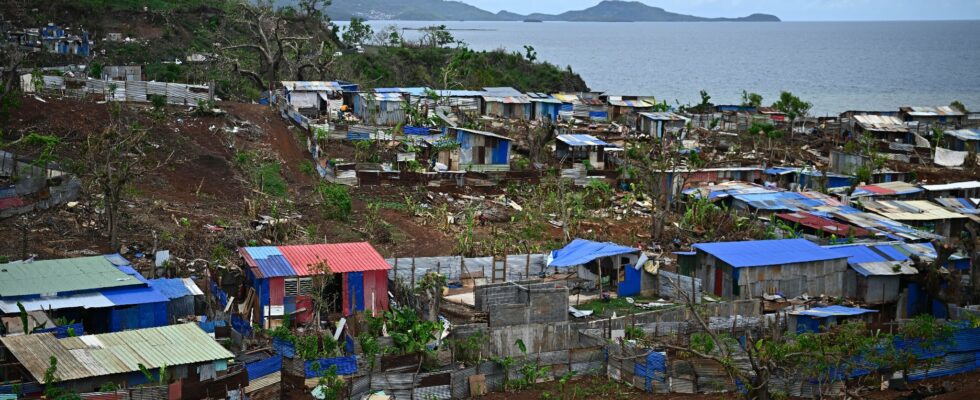This is a first emergency legislative response, aimed at “very short-term” measures to put Mayotte, devastated by Cyclone Chido on December 14, back on its feet. This Wednesday, January 8, a bill for the reconstruction of the island must be presented to the Council of Ministers.
In the context of “exceptional natural calamity” decreed by the State on December 18, the text includes around twenty emergency measures. According to the explanatory memorandum of the bill, the objective is to allow public actors to “restore the living conditions of the inhabitants” while “preparing the reconstruction” of the small French archipelago in the Indian Ocean. For longer-term measures, particularly around questions of immigration, security and economic development, the government is planning another draft “program law” which will be developed within three months, indicates Matignon.
Facilitate the reconstruction of schools and infrastructure
According to Matignon, the text of the emergency law thus aims to waive “for two years” the rules of town planning and public procurement, to facilitate the reconstruction of schools but also infrastructure and housing. The law will provide that “constructions for emergency accommodation built in Mayotte after December 14, 2024 and until the expiration of a period of two years following the publication of this law […] are exempt from any formality under the town planning code.
Concerning schools, hard hit while Mayotte is the youngest department in France with one in two minors, the project provides that “the State or one of its public establishments” can ensure their construction, reconstruction or renovation instead. place of local authorities until December 31, 2027. To carry out this mission, the text plans to expand the missions of the public land and development establishment of Mayotte (EPFAM) to entrust it with “the mission of coordinating the reconstruction work of Mayotte. A personality must be appointed at its head, according to Matignon.
Economic and social measures
On land, while it is often difficult to formally identify the owners of land in Mayotte, the text provides for deviating from the usual rules and being able to expropriate before an owner has been identified, even if it means compensating them retrospectively. . The text will also contain several economic measures which will remain in force “until March 31, 2025”, such as the suspension of the recovery of social security contributions from self-employed workers, the extension of the rights of socially insured and the unemployed or the increase in the coverage partial unemployment charge.
Nothing, however, on precarious housing, although François Bayrou had promised during his trip at the end of December to “prevent the reconstruction” of shanty towns in Mayotte. “The text is unacceptable because it provides no response to the real emergencies of Mayotte”, believes the former deputy and LR vice-president in charge of Overseas Mansour Kamardine, calling for “a measure which includes the ban on slums” in the archipelago. For her part, Liot MP from Mayotte Estelle Youssouffa, without commenting on the emergency bill, demanded that “Mayotte entrepreneurs be given priority over contracts” for the reconstruction of the archipelago.
According to parliamentary sources, the text will go to the Economic Affairs Committee of the National Assembly on January 13, the day the Assembly resumes activity. Its examination in committee could continue on Tuesday, before an examination of the text in session on January 20.
